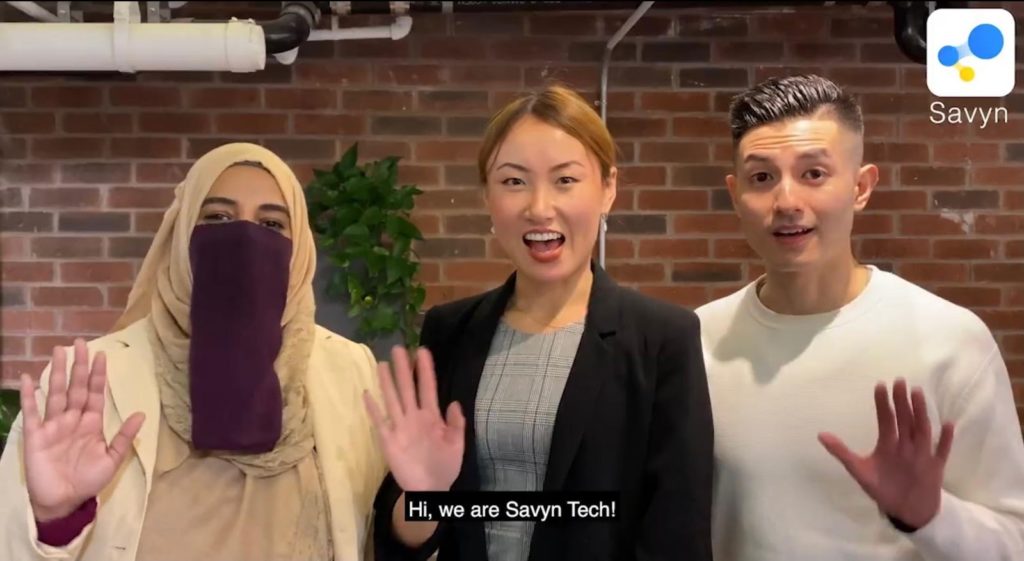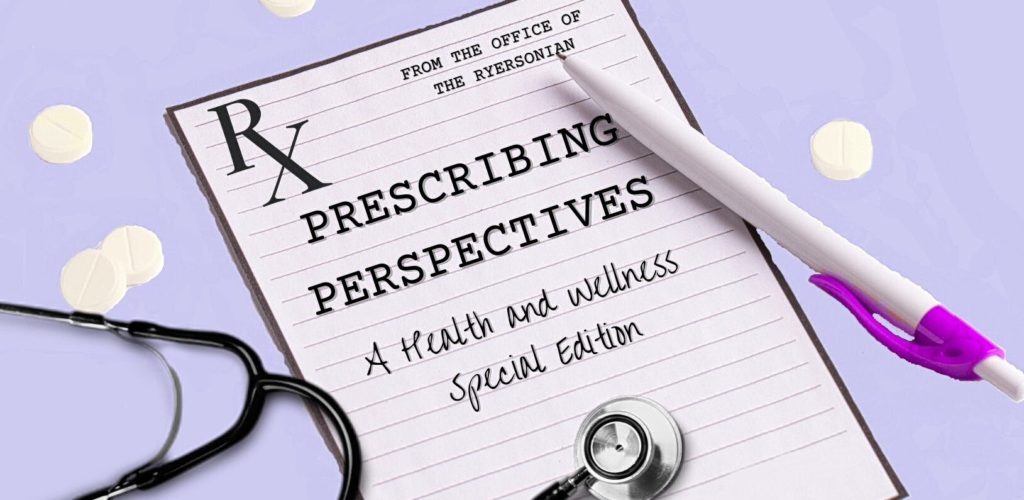The personal experiences of the three founders drove them to make this platform

When Sakeena Mihar was out for a walk one day, her heart suddenly started beating very fast. She couldn’t breathe and she felt like her brain was frozen. She immediately had to stop walking. She didn’t know what was happening to her body.
Mihar is an immigrant from a war-torn country. She used to hear sirens blaring during the war. After immigrating to Toronto, she would experience a panic attack whenever she heard sirens.
“From a country of war, I have experienced trauma myself,” said Mihar. “Even after I left my country, the symptoms persisted. I didn’t know what was happening to me, until one day, one of my friends told me that I probably had PTSD.”
According to the American Psychiatric Association, Post Traumatic Stress Disorder (PTSD) is a psychiatric disorder that may occur in people who have experienced or witnessed a traumatic event such as a natural disaster, a serious accident, a terrorist act, war/combat, or rape or who have been threatened with death, sexual violence or serious injury.
PTSD can occur in all people of any ethnicity, nationality or culture and at any age. Women are twice as likely as men to have PTSD.
“I had lived with PTSD for a long time and I didn’t even know it,” said Mihar. “I sought out a therapist and I feel a lot better now. I know from within my community, a lot of people would have felt the same thing but wouldn’t know what to name it and they wouldn’t be speaking about it because of the stigma.”
That’s one of the main reasons that Mihar decided to launch Savyn Tech, a digital platform to help people experiencing PTSD.
Savyn is an award-winning social impact venture for inclusive digital mental health care, providing virtual PTSD therapy in multiple languages. They simulate methods of therapy that are clinically proven to be effective treatments for managing panic attacks, triggers and other trauma symptoms.
Savyn also helps people with PTSD by providing coping strategies that are easy to access anywhere and anytime and reduces the barriers of culture, language and financial costs.
Apart from working in the technology industry, Mihar is also a diversity and inclusion consultant, providing equity, diversity and inclusion training for various organizations. She also co-founded Ryerson University’s Muslim faculty and staff network when she was working at the university.
In 2018, Mihar met Yang Wang and Vic Shao-Chih Chiang, who would become co-founders of Savyn Tech, at the world’s largest open innovation competition, Cooperathon.
At the event, they had shared their aspiration to make a difference in communities where mental health is stigmatized and they were honoured to receive the social impact prize at Cooperathon. With their combined passion for helping others, personal experiences with PTSD and the scientific backings for digital therapeutics, they all think the launch of Savyn’s platform will help many people in vulnerable communities.
Savyn hopes to build a supportive community where people with PTSD feel safe and comfortable to share their experiences, coping skills and eventually heal together.
“We found out that we all had very similar stories of coping with a mental health problem, issue, or condition,” said Mihar, now the chief executive officer and the founder of Savyn. “At the same time, we were amazed that all three of us were immigrants. That was another reason that we decided to do something together.”
“It is a tech startup developing inclusive mental health digital solutions for PTSD in multiple languages so vulnerable groups like immigrants and refugees can access them easily,” said Wang, co-founder and chief marketing officer (CMO) of Savyn, who also experienced mental health challenges after she came to Canada as an international student.
The first year of university was tough for Wang, primarily because of the language barrier and the cultural differences along with academic pressure. However, Wang managed to get through it and she graduated as one of the top students in her program.
Wang then started a full-time job in Montreal, where she eventually got promoted to a leadership role. ButWang felt a lot of pressure on her shoulders. Everything seemed to be going well until one day, she had a bad panic attack.
“It was a day when I was taking the subway to go to work as usual,” Wang said. “Suddenly, I just couldn’t breathe and I couldn’t even stand on my feet. I felt I was going to die at that moment. I just wanted to call 911 while wishing that my family was here with me.”
Wang was sent to the emergency room and she was told that what she experienced was just a panic attack.
“I was so scared of the near-death experience. I never realized mental health was that important until I had that moment. That was the first time in my life that I started to pay attention to mental health,” said Wang. “As immigrants, we usually put ourselves in survivor mode as we try to overcome difficulties such as language barriers, culture differences, employment opportunities, access to services, housing and establish a life in a new country. Mental health can be neglected especially in communities where it’s still stigmatized.”
That is what motivated Wang to co-found Savyn in order to raise awareness of mental health, reduce mental health stigma and give back to the community with her expertise and experience. Wang’s specializations include product development, innovation, marketing and business management.
“By doing what we do at Savyn, we want to provide a safe and non-judgemental community where everyone feels comfortable to share their stories, experience and heal together,” Wang added.
Another co-founder and chief scientist officer (CSO) of Savyn, Chiang, is a sexual diversity neuroscientist. He has done different types of research, from clinical trials to microRNAs, brain cancer and Alzheimer’s disease. His expertise contributes to how Savyn is providing a science-based platform.
“My angle on PTSD stems primarily from my neuroscience background,” said Chiang. He said he is fortunate that he does not suffer from PTSD despite traumas he has faced in the past. However, there are some other challenges that he said he is currently experiencing.
“I’m gay and I know that epidemiological studies do show LGBTQ2S+ individuals suffer twice the risk of developing PTSD.”
Data compiled by Rainbow Health Ontario and Canadian Mental Health Association (CMHA) Ontario shows that LGBTQ2S+ identified people have higher rates of depression, anxiety, obsessive-compulsive and phobic disorders, suicidal thoughts, self-harm and substance use issues.
“We know that PTSD patients have a tremendously high rate of suicide. That’s why I co-founded Savyn in order to help more people, particularly marginalized minorities.” said Chiang.
Chiang added that he wants to especially thank Mihar for her full-time dedication to Savyn, that has enabled the phenomenal progress the startup has had.
“Savyn is currently incubating at Ryerson University’s Social Ventures Zone and Biomedical Zone, which is a partnership with St. Michael’s Hospital,” said Chiang. “Savyn envisions future advancements to enhance therapy adherence with chatbots, pets and gamification components.”
Savyn has also received funding from the Investment Readiness Program (IRP). The IRP is funded by the Government of Canada and supports social purpose organizations that contribute to solving pressing social, cultural and environmental challenges across the country — but it was a long process to receive the good news. “Getting funding for social impact ventures in the early stages can be a challenge,” says Mihar. “We are grateful that the government is prioritizing mental health and providing funding opportunities for community run social impact ventures.”
Savyn is also meeting two of the United Nations Sustainable Development Goals (SDGs). Meeting SDG parts three and 11 require making health care accessible and equal for all including underserved populations such as refugees, immigrants, homeless and incarnated people, all of which Savyn is aiming to reach.
An earlier study, published in Psychological Medicine, which included 714 hospitalized patients at five hospitals in Wuhan in March 2020. The study found that 96 per cent of people surveyed had post-COVID-19 PTSD. Half of the patients surveyed said that online mental health counselling would be helpful.
“PTSD can improve by itself, but many people need treatment,” said Mihar. “The more chronic it gets, the more negative the impact on the brain, and the harder to treat. We have effective online digital treatments available and we’re now working on releasing a digital therapy platform on an app. This way, we can help more people with PTSD.”
Mihar said that anyone experiencing PTSD can visit Savyn’s website, www.savyntech.com, to get digital treatments online.

This article may have been created with the use of AI tools such as
